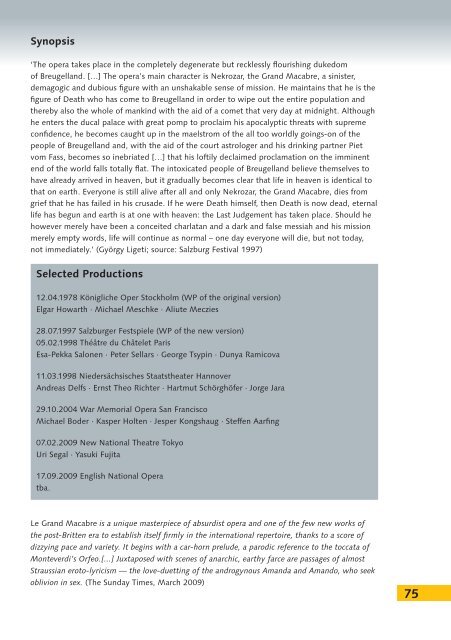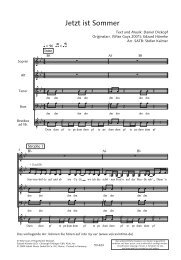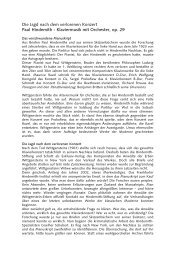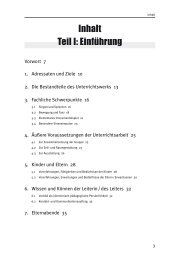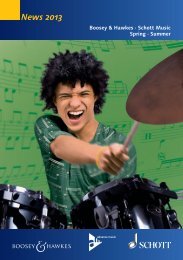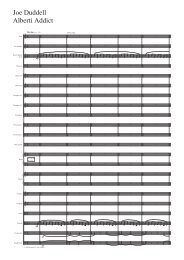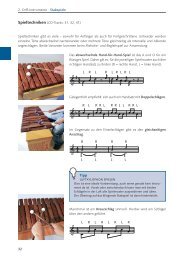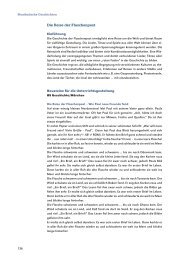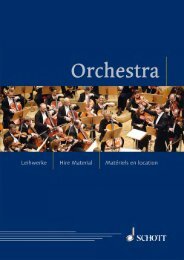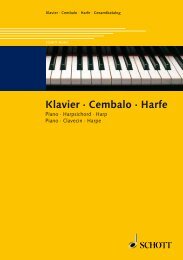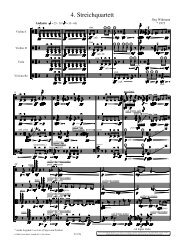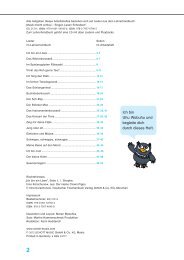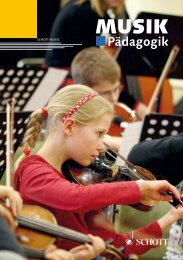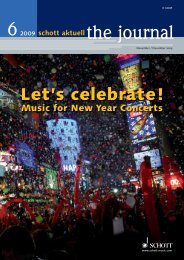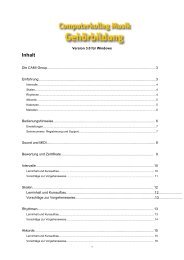Music Theatre since 1990 - Schott Music
Music Theatre since 1990 - Schott Music
Music Theatre since 1990 - Schott Music
Create successful ePaper yourself
Turn your PDF publications into a flip-book with our unique Google optimized e-Paper software.
Synopsis<br />
‘The opera takes place in the completely degenerate but recklessly flourishing dukedom<br />
of Breugelland. […] The opera’s main character is Nekrozar, the Grand Macabre, a sinister,<br />
demagogic and dubious figure with an unshakable sense of mission. He maintains that he is the<br />
figure of Death who has come to Breugelland in order to wipe out the entire population and<br />
thereby also the whole of mankind with the aid of a comet that very day at midnight. Although<br />
he enters the ducal palace with great pomp to proclaim his apocalyptic threats with supreme<br />
confidence, he becomes caught up in the maelstrom of the all too worldly goings-on of the<br />
people of Breugelland and, with the aid of the court astrologer and his drinking partner Piet<br />
vom Fass, becomes so inebriated […] that his loftily declaimed proclamation on the imminent<br />
end of the world falls totally flat. The intoxicated people of Breugelland believe themselves to<br />
have already arrived in heaven, but it gradually becomes clear that life in heaven is identical to<br />
that on earth. Everyone is still alive after all and only Nekrozar, the Grand Macabre, dies from<br />
grief that he has failed in his crusade. If he were Death himself, then Death is now dead, eternal<br />
life has begun and earth is at one with heaven: the Last Judgement has taken place. Should he<br />
however merely have been a conceited charlatan and a dark and false messiah and his mission<br />
merely empty words, life will continue as normal – one day everyone will die, but not today,<br />
not immediately.’ (György Ligeti; source: Salzburg Festival 1997)<br />
Selected Productions<br />
12.04.1978 Königliche Oper Stockholm (WP of the original version)<br />
Elgar Howarth · Michael Meschke · Aliute Meczies<br />
28.07.1997 Salzburger Festspiele (WP of the new version)<br />
05.02.1998 Théâtre du Châtelet Paris<br />
Esa-Pekka Salonen · Peter Sellars · George Tsypin · Dunya Ramicova<br />
11.03.1998 Niedersächsisches Staatstheater Hannover<br />
Andreas Delfs · Ernst Theo Richter · Hartmut Schörghöfer · Jorge Jara<br />
29.10.2004 War Memorial Opera San Francisco<br />
Michael Boder · Kasper Holten · Jesper Kongshaug · Steffen Aarfing<br />
07.02.2009 New National <strong>Theatre</strong> Tokyo<br />
Uri Segal · Yasuki Fujita<br />
17.09.2009 English National Opera<br />
tba.<br />
Le Grand Macabre is a unique masterpiece of absurdist opera and one of the few new works of<br />
the post-Britten era to establish itself firmly in the international repertoire, thanks to a score of<br />
dizzying pace and variety. It begins with a car-horn prelude, a parodic reference to the toccata of<br />
Monteverdi’s Orfeo.[...] Juxtaposed with scenes of anarchic, earthy farce are passages of almost<br />
Straussian eroto-lyricism — the love-duetting of the androgynous Amanda and Amando, who seek<br />
oblivion in sex. (The Sunday Times, March 2009)<br />
75


